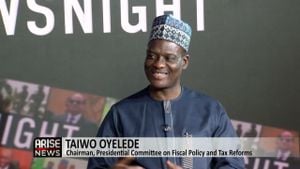Germany's Chancellor Olaf Scholz made headlines yesterday with his surprise visit to Kyiv, where he met with President Volodymyr Zelenskyy to discuss military support amid the continuing turmoil of the Russia-Ukraine war. This unexpected trip marks Scholz's first visit to Ukraine in over two years and signals Germany's unwavering commitment to backing Kyiv, especially as the conflict enters another week of intense violence.
During this visit, Scholz announced the delivery of military equipment worth approximately €650 million (around £539 million), reiteration his stance: "Germany will remain Ukraine's strongest supporter in Europe." These statements come after Hilary Clinton criticized his previous communications with Russian President Vladimir Putin, deeming it detrimental to diplomatic efforts aimed at isolulating the Kremlin leader.
The urgency of military support could not be overstated, particularly after troubling reports emerged from Ukraine indicating significant attacks. A drone strike launched by Russia hit the western Ukrainian city of Ternopil, killing one individual and injuring several others. Local military authorities confirmed the incident, highlighting the indiscriminate nature of the conflict—evident by the drone hitting a residential building hundreds of miles from the front lines.
The Ukrainian Air Force reported they successfully shot down 52 out of 110 drones launched by Russia during the overnight attack. The situation on the ground remains dire, with additional Russian attacks resulting in casualties across various regions. Just days earlier, four fatalities were recorded following another missile strike on Dnipropetrovsk, showcasing the brutality and expansion of warfare as civilians continue to bear the brunt of the conflict.
Reports also suggest Russian forces are making rapid advances toward key defensive positions. The British Defense Ministry disclosed alarming developments, indicating the town of Velyka Novosilka is growing increasingly vulnerable following the recent capture of Vuhledar by Russian troops. Analysts warn these movements could trigger significant shifts on the eastern front.
On the Russian side, defense officials claimed to have downed 15 Ukrainian drones overnight and asserted control over two settlements, bringing fresh territories under Russian grip. This resurgence of activity from Moscow follows months of slower progress, indicating renewed vigor and capability within the Russian military structure.
The diplomatic front also remains unsettled. Zelenskyy suggested Ukraine could potentially join NATO, albeit without enforcement of the collective defense clause on any occupied territories. This indication reflects both desperation and strategic maneuvering on Ukraine's part to secure broader international support as the war grinds on.
Leaders across Europe responded to the conflict's intensification as well. French President Emmanuel Macron re-affirmed support for Ukraine during his conversations with Zelenskyy, following the insightful remarks of Kaja Kallas and Antonio Costa's arrival to Kyiv. These leaders represent the EU's commitment at various levels, symbolizing regional solidarity as the war continues to demand responses.
Meanwhile, Zelenskyy has replaced the commander of Ukraine's land forces, possibly to inspire renewed efficacy within the military ranks amid significant manpower shortages as fighting escalates. Major-General Mykhailo Drapatyi is now tasked with leading Ukrainian forces after the previous commander was put to the test since earlier major offensives began.
The war has stretched on for nearly two years, but the casualties continue to mount, as the struggle for survival and sovereignty remains at the forefront. Zelenskyy's words resonate with the urgency felt among many Ukrainians: security guarantees and military expanse are fundamental at this juncture.
Compounding tensions, North Korean leader Kim Jong Un has asserted Ukraine's use of advanced weaponry stems from military support from the United States, complicity Russia seems to leverage to dictate narratives around their own military posture. These geopolitical stakes overlay with the immediate reality facing both fighting sides—and the populations caught between.
Putin's recently approved military budget, highlighting significant increases for military expenditures as the conflict wears on, adds another layer of magnitude and provides little prospect for swift resolutions. This commitment symbolizes the determination of the Kremlin to persist, regardless of mounting losses on both sides.
With winter fast approaching and the harsh conditions exacerbated by the war's devastation, the plight of civilians, faced with resources dwindling daily, occupies center stage. They remain hopeful yet wary as global leaders convene to deliver support, knowing full well the sacrifices made come with consequences.
Looking forward, as negotiations and combat operations continue, the biggest question remains: how to navigate the volatile period of the Russia-Ukraine conflict to enable peace? The stakes are high as the factions involved wrestle for control, identity, and preservation on multiple fronts.



